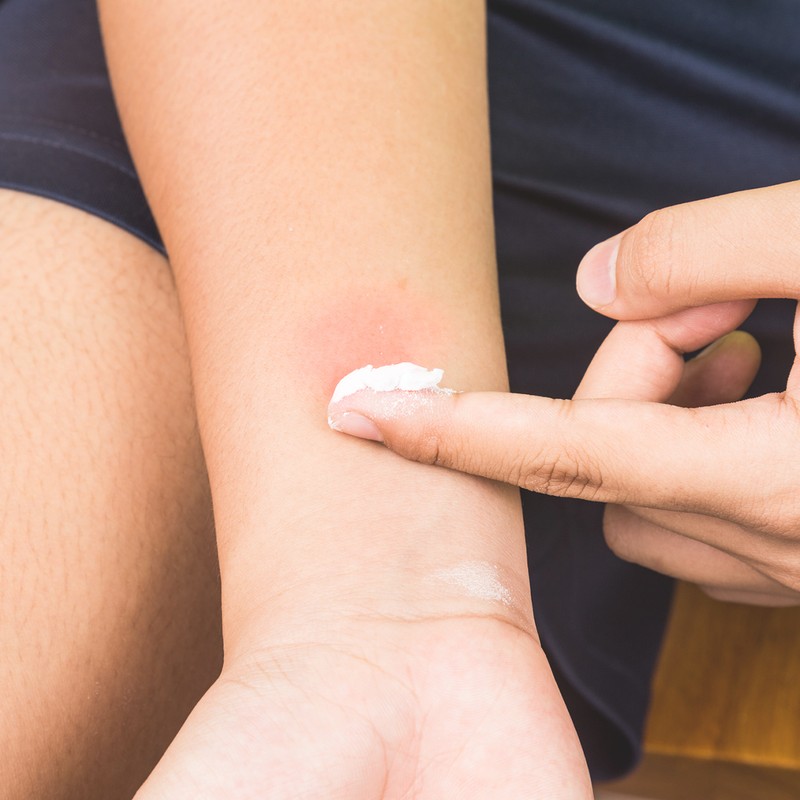How To Deal With Insect Bites & Stings This Summer
What should you do if you’ve been bitten or stung?
To treat an insect bite or sting, the NHS recommend you do the following as soon as possible…
- Remove the sting or tick if it's still in the skin
- Wash the affected area with soap and water
- Apply a cold compress (such as a flannel or cloth cooled with cold water) or an ice pack to any swelling for at least ten minutes
- Raise or elevate the affected area if possible, to help reduce swelling
- Avoid scratching the area, to reduce the risk of infection
- Avoid traditional home remedies, such as vinegar and bicarbonate of soda, as they're unlikely to help
- Ask your pharmacist about over-the-counter treatments that can help, such as painkillers, creams for itching and antihistamines
And when should you seek medical advice?
Most insect bites and stings aren’t serious – and it’s perfectly normal for swelling and itchiness from insect bites or stings to last anything from a few hours to a few days.
However, if you’re symptoms aren’t improving, you could be suffering from a mild allergic reaction – this is where a larger area around the bite or sting becomes swollen, red and painful. This should pass within a week. And occasionally, a severe allergic reaction (anaphylaxis) can occur, causing symptoms such as breathing difficulties, dizziness and a swollen face or mouth. This requires immediate medical treatment.
Insect bites and stings can also become infected or spread serious illnesses such as Lyme disease and malaria – both of which also need immediate medical treatment.
Contact your GP, call NHS 111 for advice or, if you’re abroad, visit your nearest health centre if:
- You're worried about a bite or sting
- Your symptoms don't start to improve within a few days or are getting worse
- You've been stung or bitten in your mouth or throat, or near your eyes
- A large area (around 10cm or more) around the bite becomes red and swollen
- You have symptoms of a wound infection, such as pus or increasing pain, swelling or redness
- You have symptoms of a more widespread infection, such as a fever, swollen glands and other flu-like symptoms
Dial 999 for an ambulance immediately or, if you’re abroad, the appropriate emergency services number if you or someone else has symptoms of a severe reaction, such as:
- Wheezing or difficulty breathing
- A swollen face, mouth or throat
- Nausea or vomiting
- A fast heart rate
- Dizziness or feeling faint
- Difficulty swallowing
- Loss of consciousness
How can you prevent insect bites and stings?
There are some simple precautions you can take to reduce your risk of being bitten or stung by insects, for example:
- Remain calm and move away slowly if you encounter wasps, hornets or bees – don't wave your arms around or swat at them
- Cover exposed skin by wearing long sleeves and trousers
- Wear shoes whilst outdoors
- Apply insect repellent to exposed skin – repellents that contain 50% DEET (diethyltoluamide) are most effective
- Avoid using products with strong perfumes, such as soaps, shampoos and deodorants – these can attract insects
- Be careful around flowering plants, rubbish, compost, stagnant water, and in outdoor areas where food is served
You may need to take extra precautions if you're travelling to part of the world where there's a risk of serious illnesses. For example, you may be advised to take antimalarial tablets to help prevent malaria – speak to your GP well before jetting off.
DISCLAIMER: We endeavour to always credit the correct original source of every image we use. If you think a credit may be incorrect, please contact us at info@sheerluxe.com.


